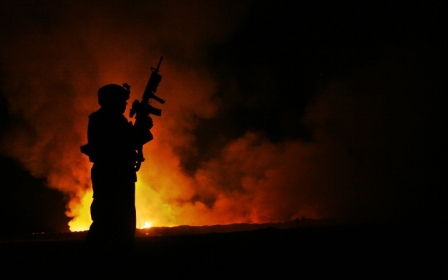Bell Pottinger UAE looking to go its own way after South Africa race row

The Middle Eastern arm of a London-based PR firm which was behind a top secret Iraq propaganda campaign could split from its parent company after a race row in South Africa.
Bell Pottinger was expelled from the Public Relations and Communications Association, the UK's PR trade body, last week and now faces closure after it was accused of exploiting racial tensions in a campaign run on behalf of South Africa’s prosperous Gupta family.
Big names such as HSBC, Waitrose and luxury goods company Richemont have since cut ties with the company.
But now, its global outposts have broken ranks and are preparing to go their own separate ways.
"We're in discussions and have submitted a proposal to head office," Archie Berens, managing director of Bell Pottinger Middle East told the BBC on Sunday.
"As a separate legal entity Bell Pottinger Middle East (BPME) is not part of these [administration] proceedings and is therefore in a position to determine its own destiny," the UAE-based division said in a statement.
Last week the company’s Asian business also announced that it was severing ties.
#WhiteMonopolyCapital
The scandal revolves around a PR and social media campaign on behalf of Oakbay Capital, a holding company belonging to the billionaire Gupta family who are close allies of South African President Jacob Zuma.
An independent report into the campaign carried out by Herbert Smith Freehills law firm found that the company has stirred up anger about “economic apartheid” and promoted the #WhiteMonopolyCapital hashtag to further the interests of the Indian-born Guptas, whose mining and media empire faces stiff competition from white-owned businesses.
“Certain material that we have seen that was created for the campaign was negative or targeted towards wealthy white South African individuals or corporates and/or was potentially racially divisive and/or potentially offensive and was created in breach of relevant ethical principles,” said the law firm.
Bell Pottinger Middle East moved to insulate the division from the scandal and said in a statement that “UAE directors actually rejected the opportunity to work on the account.”
“As an independent and financially secure business in charge of its own destiny it will now be up to us to consider a whole range of options,” Berens said.
Go-to firm for repressive regimes and 'black ops'
This is not the first time that Bell Pottinger has been accused of making dubious moral judgements.
Co-founded in 1987 by Lord Bell, who advised Margaret Thatcher on media matters, the company has risen to become one of the pre-eminent PR agencies in the world as well as the go-to place for repressive regimes, including: Asma al-Assad, wife of Syrian leader Bashar al-Assad; FW Clerk, the last president of aparthied South Africa; and Alexander Lukashenko, the Belarusian president.
The company has also worked to recast the image of the Bahraini government, which stands accused of dealing with political tensions by shooting at, disappearing, and torturing dissenters.
According to the Independent, the company sent out regular emails to journalists encouraging them to tow the government's line in Bahrain. One email described the Bahraini government's "readiness to receive the injured in hospitals" just before it began detaining doctors.
From 2011-2012, the company was awarded over $12 million of contracts across the Gulf kingdom's government, including the government's holding company, the Bahrain Economic Development Board and the Bahrain Chamber for Dispute Resolution.
Shortly after the US-led invasion of Iraq in 2003, the company ran a number of lucrative projects on behalf of the Pentagon, which included creating fake news packages that were then marketed to television stations across the region, the Bureau of Investigative Journalism revealed in 2016.
Another project in Iraq aimed to ensnare alleged militants by creating fake Al-Qaeda propaganda films, which US forces would plant in homes after a raid, before using special software to track the users of the content.
This allowed US forces to track suspected militants as far afield as Syria, Iran and the US.
"I would do a print-out [of the suspects] for the day and, if anything interesting popped up, hand it over to the bosses and then it would be dealt with from there,” Martin Well, an ex-Bell Pottinger employee told the Bureau of Investigative Journalism.
These types of black ops, used for tracking who is watching a certain thing, were a pretty standard part of the industry toolkit
- Martin Well, former Bell Pottinger employee
“These types of black ops, used for tracking who is watching a certain thing, were a pretty standard part of the industry toolkit,” he added.
According to the Bureau’s investigation, which covers the years 2007-2011, Bell Pottinger employed almost 300 British and Iraqi staff at its Baghdad base at one point and was paid more than $500 million by the Pentagon.
Last year, Middle East Eye revealed that the head of the British Home Office's PR firm, RICU, also worked for Bell Pottinger in Baghdad from 2005-2006.
New MEE newsletter: Jerusalem Dispatch
Sign up to get the latest insights and analysis on Israel-Palestine, alongside Turkey Unpacked and other MEE newsletters
Middle East Eye delivers independent and unrivalled coverage and analysis of the Middle East, North Africa and beyond. To learn more about republishing this content and the associated fees, please fill out this form. More about MEE can be found here.




